2007听力原稿(北京卷)
2007年北京市中考英语试题及答案学习啊

学英语简单吗?肯定会有许多学生说:“难死了”。
为什么有好多学生对英语的学习都感到头疼呢?答案只有一个:“不得法。
” 英语与汉语一样都是一种语言,为什么你说汉语会如此流利?那是因为你置身于一个汉语环境中,如果你在伦敦呆上半年,保准说起英语来会非常流利。
但很多中学生没有很好的英语环境,那么你可以自己设置一个英语环境,坚持“多说”、“多听”、“多读”、“多写”,那么你的英语成绩肯定会很出色。
一、多“说”。
自己多创造机会与英语教师多讲英语,见了同学,尤其是和好朋友在一起时尽量用英语去问候,谈心情……这时候你需随身携带一个英汉互译小词典,遇到生词时查一下这些生词,也不用刻意去记,用的多了,这个单词自然而然就会记住。
千万别把学英语当成负担,始终把它当成一件有趣的事情去做。
或许你有机会碰上外国人,你应大胆地上去跟他打招呼,和他谈天气、谈风景、谈学校……只是别问及他的年纪,婚史等私人问题。
尽量用一些你学过的词汇,句子去和他谈天说地。
不久你会发现与老外聊天要比你与中国人谈英语容易的多。
因为他和你交谈时会用许多简单词汇,而且不太看重说法,你只要发音准确,准能顺利地交流下去。
只是你必须要有信心,敢于表达自己的思想。
如果没有合适的伙伴也没关系,你可以拿过一本书或其它什么东西做假想对象,对它谈你一天的所见所闻,谈你的快乐,你的悲伤等等,长此坚持下去你的口语肯定会有较大的提高。
二、多“听”寻找一切可以听英语的机会。
别人用英语交谈时,你应该大胆地去参与,多听听各种各样人的发音,男女老少,节奏快的慢的你都应该接触到,如果这样的机会少的话,你可以选择你不知内容的文章去听,这将会对你帮助很大,而你去听学过的课文的磁带,那将会对你的语言语调的学习有很大的帮助。
三、多“读”。
“读”可以分为两种。
一种是“默读”。
每天给予一定时间的练习将会对你提高阅读速度有很大的好处,读的内容可以是你的课本,但最好是一些有趣的小读物,因为现在的英语高考越来越重视阅读量和阅读速度。
2007年听力原文
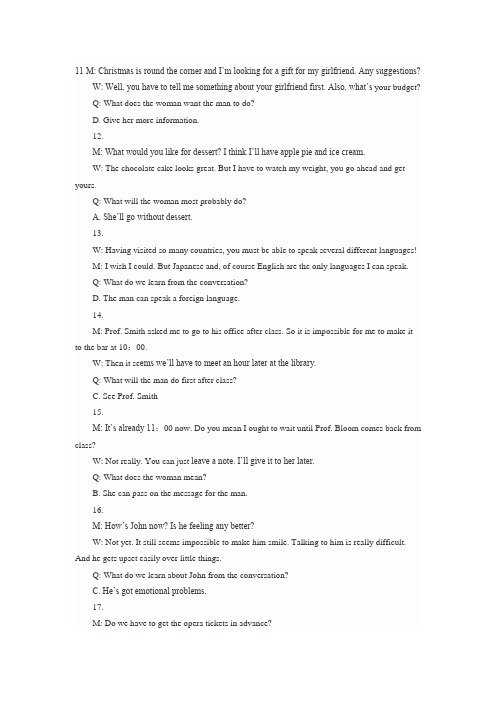
11 M: Christmas is round the corner and I‟m looking for a gift for my girlfriend. Any suggestions?W: Well, you have to tell me something about your girlfriend first. Also, what‟s your budget?Q: What does the woman want the man to do?D. Give her more information.12.M: What would you like for dessert? I think I‟ll have apple pie and ice cream.W: The chocolate cake looks great. But I have to watch my weight, you go ahead and get yours.Q: What will the woman most probably do?A. She‟ll go without dessert.13.W: Having visited so many countries, you must be able to speak several different languages!M: I wish I could. But Japanese and, of course English are the only languages I can speak.Q: What do we learn from the conversation?D. The man can speak a foreign language.14.M: Prof. Smith asked me to go to his office after class. So it is impossible for me to make it to the bar at 10:00.W: Then it seems w e‟ll have to meet an hour later at the library.Q: What will the man do first after class?C. See Prof. Smith15.M: It‟s already 11:00 now. Do you mean I ought to wait until Prof. Bloom comes back from class?W: Not really. You can just leave a note. I‟ll give it to her later.Q: What does the woman mean?B. She can pass on the message for the man.16.M: How‟s John now? Is he feeling any better?W: Not yet. It still seems impossible to make him smile. Talking to him is really difficult. And he gets upset easily over little things.Q: What do we learn about John from the conversation?C. He‟s got emotional problems.17.M: Do we have to get the opera tickets in advance?W: Certainly! Tickets at the door are usually sold at a higher price.Q: What does the woman imply?A. It‟s better to buy the tickets beforehand.18.M: The taxi driver must have been speeding.W: Well, not really! He crashed into the tree because he was trying not to hit a box that had fallen off the truck ahead of him.Q: What do we learn about the taxi driver?B. He turned suddenly and ran into a tree.Conversation OneW: Hey, Bob, guess what? I‟m going to visit Quebec next summer. I‟m invited to go to a friend‟s wedding, but while I‟m there, I‟d also like to do some sightseeing.M: That‟s nice, Sherry. But do you mean the province of Quebec or Quebec City?W: I mean the province. My friend‟s wedding is in Montreal, so I‟m going there first. I‟ll stay for 5 days. Is Montreal the capital city of the province?M: Well, many people think so because it‟s the biggest city, but it‟s not the capital. Quebec City is, but Montreal is great. The Santa Lawrence River runs right through the middle of the city. It‟s beautiful in summer.W: Wow, and do you think I can get by in English? My French is okay, but not that good. I know most people there speak French, but can I also use English?M: Well, people speak both French and English there, but you‟ll hear French most of the time and all the street signs are in French. In fact, Montreal is the third largest French-speaking city in the world. So you‟d better practice your French before you go.W: Good advice, what about Quebec City? I‟ll visit a friend from college who lives there now. Wh at‟s it like?M: It‟s a beautiful city, very old. Many old buildings have been nicely restored. Some of them were built in the 17th and 18th centuries. You‟ll love it there.W: Fantastic, I can‟t wait to go.19. What‟s the woman‟s main purpose of visiting Quebec? A. to attend a wedding in Montreal.20. What does the man advise the woman to do before the trip? D. Brush up on her French.21. What does the man say about Quebec City? C. It has many historical buildings.Conversation TwoM: Hi, Ms. Rowling. How old were you when you started to write, and what was your first book?W: I wrote my first finished story when I was about 6. It was about a small animal, a rabbit I mean, and I ve been writing ever since.M: Why did you choose to be an author?W: If someone asked me how to achieve happiness, step one would be finding out what you love doing most and step two would be finding someone to pay you to do it. I consider myself very lucky indeed to be able to support myself by writing.M: Do you have any plans to write books for adults?W: My first two novels were for adults. I suppose I might write another one, but I never really imagine a target audience when I m writing. The ideas come first, so it really depends on the idea that grabs me next!M: Where did the ideas for the Harry Potter books come from?W: I ve no idea where ideas come from and I hope I never find out, it would spoil my excitement if it turned out I just have a funny little wrinkle on the surface of my brain which makes me think about invisible train platforms.M: How do you come up with the names of your characters?W: I invented some of the names in the Harry books, but I also collect strange names. I ve gotten them from medieval saints, maps, dictionaries, plants, war memorials, and people I ve met!M: Oh, you are really resourceful.22. What do we learn from the conversation about Ms. Rowling‟s first book?23. Why does Ms. Rowling consider herself very luck?24. What dictates Ms. Rowling‟s writing?25. According to Ms. Rowling, where did she get the ideas for the Harry Potter books?22. A. It was about a little animal.23. B. She can make a living by doing what she likes.24. A. Her ideas.25. D. She doesn‟t really know where they originated.Passage oneReducing the amount of sleep students get at night has a direct impact on their performance at school during the day. According to classroom teachers, elementary and middle school students who stay up late exhibit more learning and attention problems. This has been shown by Brown Medical School and Bradly Hospital research. In the study, teachers were not told the amount of sleep students received when completing weekly performance reports. Yet they rated the students who have received eight hours or less as having the most trouble recalling old material, learning new lessons, and completing high quality work. Teachers also reported that these students had more difficulty paying attention. The experiment is the first to ask teachers to report on the effectsof sleep deficiency in children. …Just staying up late can cause increased academic difficulty and attention problems for otherwise healthy while functioning kids‟, said G. F., the study‟s lead author. So the results provide professionals and parents with a clear message: when a child is having learning and attention problems, the issue of sleep has to be taken into consideration. …If we don‟t ask about sleep and try to improve sleep patterns in kids‟ struggling academically, then we aren‟t doing our job‟, F said. For parents, he said, the message is simple. Getting kids to bed on time is as important as getting them to school on time.26. What were teachers told to do in the experiment?27. According to the experiment, what problem can insufficient sleep cause in students?28. What message did the researcher intend to convey to parents?26. D. Record students‟ weekly performance.27. B. Lack of attention.28. D. They should see to it that their children have adequate sleep.Passage twoP. P never wanted to be a national public figure. All she wanted to be was a mother and a homemaker. But her life was turned upside down when a motorist distracted by his cell phone, ran a stop sign and crashed into the side of her car. The impact killed her two-year-old daughter. Four months later, P. reluctantly but courageously decided to try to educate the public and to fight for laws to ban drivers from using cell phones while a car is moving. She wanted to save other children from what happened to her daughter. In her first speech, P. got off to a shaky start. She was visibly trembling and her voice was soft and uncertain. But as she got into her speech, a dramatic transformation took place. She stopped shaking and spoke with a strong voice. For the rest of her talk, she was a forceful and compelling speaker. She wanted everyone in the audience to know what she knew without having to learn it from a personal tragedy. Many in the audience were moved to tears, and to action. In subsequent presentations, P. gained reputation as a highly effective speaker. Her appearance on a talk show was broadcast three times transmitting her message to over 14,000,000 people. Her campaign increased public awareness of the problem and prompted over 300 cities and several states to consider restrictions on cell phone use.29. What was the significant change in P. P.‟s life?30. What had led to P.‟s personal tragedy?31. How did P. feel when she began her first speech?32. What could be expected as a result of P.‟s efforts?30. C. She became a public figure.31. C. A motorist‟s failure to concentrate.32. B. Nervous and unsure of herself.33. D. Restrictions on cell phone use while driving.Passage 3Many people catch a cold in the springtime or fall. It makes us wonder if scientists can send a man to the moon, why can‟t they find a cure for the common cold? The answer is easy. There‟re actually hundreds of kinds of cold viruses out there. You never know which one you will get, so there isn‟t a cure for each one. When a virus attacks your body, your body works hard to get rid of it. Blood rushes to your nose and causes a blockage in it. You feel terrible because you can‟t breathe well. But your body is actually eating the virus. Your temperature rises and you get a fever. But the heat of your body is killing the virus. You also have a running nose to stop the virus from getting to your cells. You may feel miserable but actually your wonderful body is doing everything it can to kill the cold. Different people have different remedies for colds. In the United States and some other countries, for example, people might eat chicken soup to feel better. Some people take hot baths and drink warm liquids. Other people take medicines to relieve variouss ymptoms of colds. There‟s one interesting thing to note. Some scientists say taking medicines when you have a cold is actually bad for you. The virus stays in you longer because your body doesn‟t develop a way to fight it and kill it.33. According to th e passage, why haven‟t the scientists find a cure for the common cold?34. What does the speaker say about the symptoms of the common cold?35. What do some scientists say about taking medicines for the common cold according to the passage?33. A. There are too many kinds of cold viruses for them to identify.34. B. They show our body is fighting the virus.35. C. It actually does more harm than good.You probably have noticed that people express similar ideas in different ways, depending on the situations they are in. This is very natural. All languages have two general levels of usage – a formal level and an informal level. English is no exception. The difference in these two levels is the situation in which you use a particular level. Formal language is the kind of language you find in textbooks, reference books and in business letters. You would also use formal English in compositions and essays that you write in school. Informal language is used in conversation with colleagues, family members and friends, and when we write personal notes or letters to close friends.Formal language is different from informal language in several ways. First, formal language tends to be more polite. What we may find interesting is that it usually takes more words to be polite. For example, I might say to a friend or a family member “Close the door, please.” But to a stranger, I probably would say, “Would you mind closing the door?” Another difference betweenformal and informal language is some of the vocabulary. There are bound to be some words and phrases that belong in formal language and others that are informal. Let‟s say that I really like soccer. If I am talking to my friend, I might say, “I am just crazy about soccer.” But if I were talking to my boss, I would probably say, “I really enjoy soccer.”36. natural37. usage38. exception39. particular40. reference41. essays42. colleagues43. personal44. What we may find interesting is that it usually takes more words to be polite.45. But to a stranger, I probably would say, “Would you mind closing the door?”46. There are bound to be some words and phrases that belong in formal language and others that are informal.。
2007年北京市英语中考题
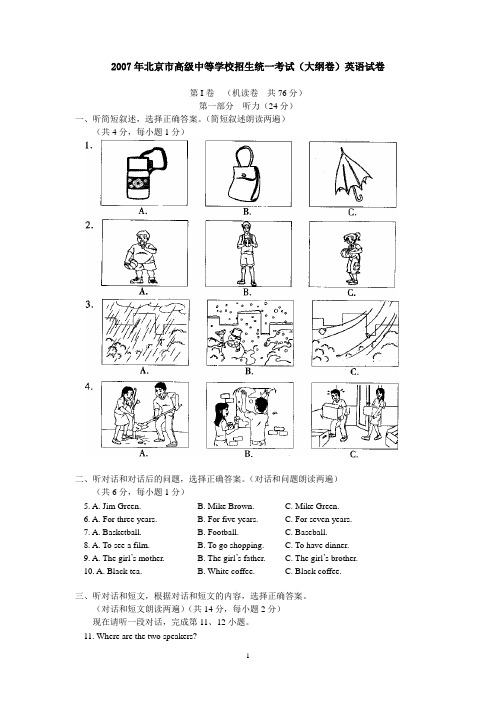
2007年北京市高级中等学校招生统一考试(大纲卷)英语试卷第I卷(机读卷共76分)第一部分听力(24分)一、听简短叙述,选择正确答案。
(简短叙述朗读两遍)(共4分,每小题1分)二、听对话和对话后的问题,选择正确答案。
(对话和问题朗读两遍)(共6分,每小题1分)5. A. Jim Green. B. Mike Brown. C. Mike Green.6. A. For three years. B. For five years. C. For seven years.7. A. Basketball. B. Football. C. Baseball.8. A. To see a film. B. To go shopping. C. To have dinner.9. A. The girl’s mother. B. The girl’s father. C. The girl’s brother.10. A. Black tea. B. White coffee. C. Black coffee.三、听对话和短文,根据对话和短文的内容,选择正确答案。
(对话和短文朗读两遍)(共14分,每小题2分)现在请听一段对话,完成第11、12小题。
11. Where are the two speakers?A. In a shop.B. In a school.C. In a hospital.12. What does the boy have to do in the afternoon?A. To stay in bedB. To go to schoolC. To do his homework.现在请听一段对话,完成第13、14小题。
13. What makes the boy tired?A. Final exams.B. Tennis matches.C. Computer games.14. When are they going to play tennis?A. In the morning.B. In the afternoon.C. In the evening.现在请听一段短文,完成第15、16、17小题。
07年北京中考英语试卷及答案

2007年北京市⾼级中等学校招⽣统⼀考试(⼤纲卷) 英语试卷 第I卷(共78分) 第⼀部分听⼒(24分) 第⼆部分笔试(54分) 四. 语⾔知识运⽤(1) (⼀)单项填空(共20分,每⼩题1分) 从下列各题所给的四个选项中选择可以填⼊空⽩处的选项。
18. My parents gave __________ a nice toy dog for my birthday.A. IB. meC. myD. mine 19. We traveled all night to London and got there __________ Sunday morning.A. forB. onC. atD. to 20. —__________ did you have the party last night? —In the park.A. WhatB. WhyC. WhenD. Where 21. __________ is watching TV. Let’s turn it off.A. SomebodyB. AnybodyC. NobodyD. Everybody 22. I’d like to go shopping with you, __________ I’m too busy today.A. butB. andC. soD. or 23. Welcome to our hotel. It’s __________ in the city.A. goodB. betterC. bestD. the best 24. The new term is coming. The students are busy __________ the classrooms.A. cleanB. cleansC. to cleanD. cleaning 25. The children will climb the hill if it __________ tomorrow.A. won’t rainB. didn’t rainC. doesn’t rainD. isn’t raining 26. —__________ you play golf? —No. But I can play table tennis.A. CanB. MayC. MustD. Should 27. I had a bad cold. The doctor asked me __________ in bed.A. stayingB. to stayC. stayedD. stays 28. —Where’s your father, Mike? —He __________ in the kitchen.A. cooksB. cookedC. is cookingD. has cooked 29. Here’s my little cat. Please __________ it while I’m away.A. look afterB. look upC. look forD. look at 30. Mr. Smith __________ a talk on country music next Monday.A. giveB. gaveC. has givenD. will give 31. My brother hurt his __________ yesterday. He can’t walk now.A. armB. legC. handD. eye 32. It’s too cold here in winter. People have to wear __________ clothes.A. warmB. newC. beautifulD. expensive 33. —Do you know __________ the MP3 player last week? —Sorry, I have no idea.A. how much did she pay forB. how much will she pay forC. how much she paid forD. how much she will pay for 34. —Would you like to see the film with me? —I’m sorry I __________it twice.A. seeB. will seeC. have seenD. am seeing 35. Today Chinese __________ by more and more people around the world.A. was spokenB. is spokenC. spokeD. speak 36. You look tired. You’d better __________ a good sleep.A. haveB. havingC. hadD. to have 37. —What good weather! Let’s go boating on the lake. —__________.A. That’s all rightB. Thank you very muchC. It doesn’t matterD. That’s a good idea (⼆)完形填空(共12分,每⼩题1分) 通读下⾯短⽂,掌握其⼤意,然后从短⽂后各题所给的四个选项中选择能填⼊相应空⽩处的选项。
2007年北京高级中等学校招生统一考试课标卷

2007年北京市高级中等学校招生统一考试(课标卷)英语试卷第I卷(机读卷,共67分)听力部分(15分)一、听对话,选择与对话内容相符的图片,将代表图片的字母填写在相应序号后的括号内。
每段对话读两遍。
(共6分,每小题1分)请看第一组的四幅图片。
听三段对话,回答第1—3题。
1.()2.()3.()请看第二组的四幅图片。
听第三段对话,回答第4—6题。
4.()5.()6.()二、听对话,根据对话内容,判断第7—10小题所给句子的正误。
正确的用A表示,错误的用B表示。
每段对话读两遍。
(共4分,每小题1分)听第一段对话,判断第7—8小题。
7.The girl wants to go to the post office.8.She will take a taxi there.听第二段对话,判断第9—10小题。
9.Mike likes London very much.10.Mike is coming back next Monday.三、听对话,根据对话内容,从下列各题所给的A、B、C三个选项中,选择最佳选项。
每段对话读两遍。
(共5分,每小题1分)听第一段对话,回答第11—12小题。
11.Whose birthday is on July 1st?A.The mother’s. B.The father’s. C.The boy’s.12.What are they going to get for their father?A.A watch. B.A flower. C.A sweater.听第二段对话,回答第13—15小题。
13.Who came to the party last night?A.Betty’s friends. B.Peter’s friends. C.Ben’s friends.14.When did Ben get up before breakfast?A.About 4:00. B.About 5:00. C.About 6:00.15.How does Ben feel now?A.Worried. B.Excited. C.Annoyed.请打开第Ⅱ卷,看第一大题听力试题。
2007全国各地高考英语听力(录音稿)

W: How about a tour to Southeast Asia?
6. M: Ladies and Gentlemen, let’s welcome Jane Carter. Jane, you are so young. How can you sing so well?
M: See my secretary. She will set you up with the test.
W: When?
M: Next month.
W: I can’t wait that long.
M: Excuse me?
W: I can’t wait a month. I need something sooner.
2007全国各地高考英语听力(录音稿)
高考有听力的:
1、全国I(河北、河南、山西、广西)、福建、安徽、江苏、江西、辽宁、山东、海南、宁夏、四川
2、北京 3、广东 4、湖北 5、湖南 6、上海 7、天津 8、重庆
高考无听力的:
全国II(吉林 黑龙江 云南 贵州 新疆 青海 甘肃 内蒙 西藏)、陕西、浙江
M: My electricity bill is about 50 dollars a month, and my telephone bill is usually 24 dollars a month.
W: How much do you pay for transportation?
M: 30 dollars a month.
M: She took the train, and it was late too.
14-2007年北京市高级中等学校招生统一考试英语试卷
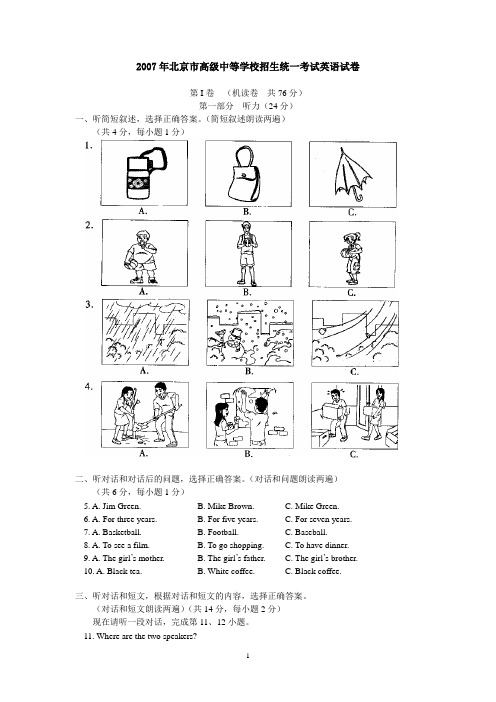
2007年北京市高级中等学校招生统一考试英语试卷第I卷(机读卷共76分)第一部分听力(24分)一、听简短叙述,选择正确答案。
(简短叙述朗读两遍)(共4分,每小题1分)二、听对话和对话后的问题,选择正确答案。
(对话和问题朗读两遍)(共6分,每小题1分)5. A. Jim Green. B. Mike Brown. C. Mike Green.6. A. For three years. B. For five years. C. For seven years.7. A. Basketball. B. Football. C. Baseball.8. A. To see a film. B. To go shopping. C. To have dinner.9. A. The girl’s mother. B. The girl’s father. C. The girl’s brother.10. A. Black tea. B. White coffee. C. Black coffee.三、听对话和短文,根据对话和短文的内容,选择正确答案。
(对话和短文朗读两遍)(共14分,每小题2分)现在请听一段对话,完成第11、12小题。
11. Where are the two speakers?A. In a shop.B. In a school.C. In a hospital.12. What does the boy have to do in the afternoon?A. To stay in bedB. To go to schoolC. To do his homework.现在请听一段对话,完成第13、14小题。
13. What makes the boy tired?A. Final exams.B. Tennis matches.C. Computer games.14. When are they going to play tennis?A. In the morning.B. In the afternoon.C. In the evening.现在请听一段短文,完成第15、16、17小题。
2007年高考英语试题(北京卷)

2007年普通高等学校夏季招生考试英语(北京卷)本试卷分第Ⅰ卷(选择题)和第Ⅱ卷(非选择题)两部分,第Ⅰ卷1至15页,第Ⅱ卷16至17页,共150分。
考试时间120分钟。
考试结束后,将本试卷和答题卡一并交回。
注意事项:1. 答题前考生务必分别将答题卡I和答题卡Ⅱ上的姓名、准考证号用黑色字迹的签字笔填写,用2B铅笔将准考证号对应的信息点涂黑。
2. 答试卷第Ⅰ卷时,每小题选出答案后,用2B铅笔把答题卡Ⅰ上对应题目的答案选中涂满涂黑,黑度以盖住框内字母为准。
如需改动,用橡皮擦除干净后再选涂其它答案项。
在试卷上答题无效。
3. 答试卷第Ⅱ卷时,必须用黑色字迹的签字笔按题号顺序答在答题卡Ⅱ的红色框答题区域相应位置内,未在对应的答题区域做答或超出答题区域做答均不得分。
在试卷上答题无效。
第Ⅰ卷(选择题共115分)第一部分:听力理解(共两节,30分)第一节(共5小题;每小题1.5分,共7.5分)听下面5段对话。
每段对话后有一道小题,从每题所给的A、B、C三个选项中选出最佳选项。
听完每段对话后,你将有10秒钟的时间来回答有关小题和阅读下一小题。
每段对话你将听一遍。
例:What is the man going to read?A. A newspaper.B. A magazine.C. A book.答案是A。
1. Where is the man from?A. Atlanta.B. New York.C. Washington,D.C.1.A2. How much is the man’s telephone bill?A. $50.B. $24.C. $30.2.B3. What does the woman want to watch?A. News.B. “Animal World”.C. Movie.3. C4. Which apartment is the woman interested in?A. The one-bedroom apartment.B. The two-bedroom apartment.C. The three-bedroom apartment.4. A5. What is the woman doing?A. Giving advice.B. Asking the way.C. Making a request.5. C第二节(共15小题;每小题1.5分,共22.5分)听下面6段对话或独白。
2007北京听力原文
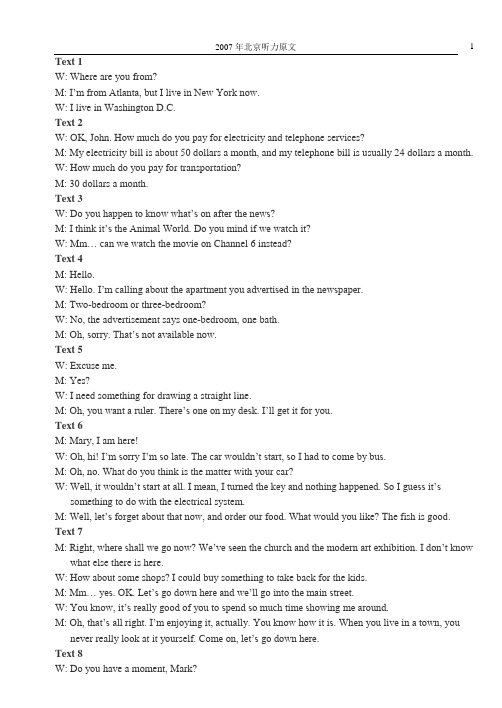
Text 1W: Where are you from?M: I’m from Atlanta, but I live in New York now.W: I live in Washington D.C.Text 2W: OK, John. How much do you pay for electricity and telephone services?M: My electricity bill is about 50 dollars a month, and my telephone bill is usually 24 dollars a month. W: How much do you pay for transportation?M: 30 dollars a month.Text 3W: Do you happen to know what’s on after the news?M: I think it’s the Animal World. Do you mind if we watch it?W: Mm… can we watch the movie on Channel 6 instead?Text 4M: Hello.W: Hello. I’m calling about the apartment you advertised in the newspaper.M: Two-bedroom or three-bedroom?W: No, the advertisement says one-bedroom, one bath.M: Oh, sorry. That’s not available now.Text 5W: Excuse me.M: Yes?W: I need something for drawing a straight line.M: Oh, you want a ruler. There’s one on my desk. I’ll get it for you.Text 6M: Mary, I am here!W: Oh, hi! I’m sorry I’m so late. The car wouldn’t start, so I had to come by bus.M: Oh, no. What do you think is the matter with your car?W: Well, it wouldn’t start at all. I mean, I turned the key and nothing happened. So I guess it’s something to do with the electrical system.M: Well, let’s forget about that now, and order our food. What would you like? The fish is good. Text 7M: Right, where shall we go now? We’ve seen the church and the modern art exhibition. I don’t know what else there is here.W: How about some shops? I could buy something to take back for the kids.M: Mm… yes. OK. Let’s go down here and we’ll go into the main street.W: You know, it’s really good of you to spend so much time showing me around.M: Oh, that’s all right. I’m enjoying it, actually. You know how it is. When you live in a town, you never really look at it yourself. Come on, let’s go down here.Text 8W: Do you have a moment, Mark?M: Yeah, sure, Susan.W: I know this is short notice, but I wonder if you’d be able to fly out and give a speech about our project this weekend.M: But I thought you were going to do that.W: Well, yes. I was. But I’m terribly busy at the moment.M: This weekend? Couldn’t John go? He knows all about the project.W: Yeah, but he doesn’t know the people, and he doesn’t know the city. Mark, I think you’re the right person for the job.M: I get the message.W: Thanks, Mark.M: Yeah.Text 9W: Hi, Tony!M: Hello, Kate! How are you?W: Oh, fine, thanks, and you and Jane?M: Oh, we’re fine. How long are you staying?W: Just a couple of days. And then I’ll be back to work in Tokyo.M: What a pity you are not staying in London for a bit longer. Anyway, how about dinner tonight? W: I’d love to, but I’m seeing some customers from Oxford this evening. What about tomorrow?M: That’d be lovely. Jane will be pleased.W: What time shall I come?M: How about eight?W: Great. I’ll see you tomorrow then.Text 10W: Oh, Frank’s in your class? He was in my class last term. I didn’t like him at all.M: What? You didn’t like Frank? He’s one of my best students.W: Oh, no. Not Frank! He was always asking questions. Frank always interrupted me and the other students. He was never quiet.M: Yes, that’s Frank. That’s why he is such a good student. He is always thinking and trying to use English. He laughs a lot. Frank doesn’t worry about making mistakes. I enjoy having hi m in class. W: Not me. I love students like David. Do you have him in your conversation class this term?M: Yes, but to be honest, David is too quiet for me. I can’t tell if he’s learning. David is so silent. He doesn’t say anything.W: Yes, that’s David. That’s how good students should be. They have to listen to their teachers.Text 11M: When I tell people that I paint the Golden Gate Bridge, they think I start at one end, paint to the other end, and then start again. But that’s not true. We are always painting the bridge. But we have to go where paint is in bad condition. It’s a dangerous job. You have to be careful all the time.You can’t work or appear without safety equipment. And the weather, it gets colder up here.Sometimes it’s so cold there’s ice on the bridge. You have to wear warm clothes. Sometimes it’s windy and foggy. On foggy days, you can’t see anything. Other times, you are both the fog. Theview from the top is the thing that I love about the job. On a sunny day like today, you can see from the ocean to the port and all the way to the mountains.。
2007年全国高考听力及原文(全国卷1卷)
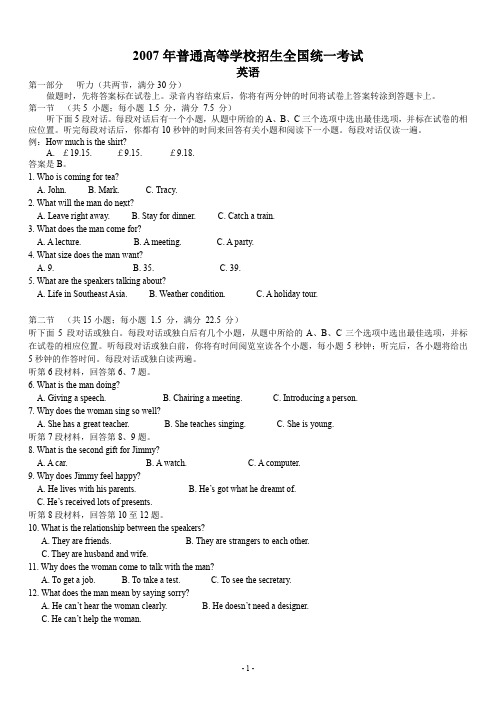
2007年普通高等学校招生全国统一考试英语第一部分听力(共两节,满分30分)做题时,先将答案标在试卷上。
录音内容结束后,你将有两分钟的时间将试卷上答案转涂到答题卡上。
第一节(共5 小题;每小题1.5 分,满分7.5 分)听下面5段对话。
每段对话后有一个小题,从题中所给的A、B、C三个选项中选出最佳选项,并标在试卷的相应位置。
听完每段对话后,你都有10秒钟的时间来回答有关小题和阅读下一小题。
每段对话仅读一遍。
例:How much is the shirt?A.£19.15. £9.15. £9.18.答案是B。
1. Who is coming for tea?A. John.B. Mark.C. Tracy.2. What will the man do next?A. Leave right away.B. Stay for dinner.C. Catch a train.3. What does the man come for?A. A lecture.B. A meeting.C. A party.4. What size does the man want?A. 9.B. 35.C. 39.5. What are the speakers talking about?A. Life in Southeast Asia.B. Weather condition.C. A holiday tour.第二节(共15小题;每小题1.5 分,满分22.5 分)听下面5 段对话或独白。
每段对话或独白后有几个小题,从题中所给的A、B、C三个选项中选出最佳选项,并标在试卷的相应位置。
听每段对话或独白前,你将有时间阅览室读各个小题,每小题5秒钟;听完后,各小题将给出5秒钟的作答时间。
每段对话或独白读两遍。
听第6段材料,回答第6、7题。
6. What is the man doing?A. Giving a speech.B. Chairing a meeting.C. Introducing a person.7. Why does the woman sing so well?A. She has a great teacher.B. She teaches singing.C. She is young.听第7段材料,回答第8、9题。
2007年普通高等学校招生全国统一考试英语(北京卷)

2007年普通高等学校招生全国统一考试英语(北京卷)参考答案第一部份:听力理解第一节1.a2.b3.c4.a5.c第二节6.b7.c8.c9.c 10.a 11.a 12.a 13.b14.c 15.b 16.b 17.b 18.a 19.c 20.b第二部分:知识运用第一节单项填空21.a 22.b 23. d 24.d 25.b 26.c 27. c 28. a 29.b 30.b 31.d 32.c 33.d 34.c 35.a第二节完形填空36.b 37.a 38.c 39.b 40.d 41.c 42a 43d 44b 45 a 46.b 47.d 48.c 49.d 50.c 51.a 52.b 53 a 54 c 55d第三部分:阅读理解56 a 57c 58a 59b 60b 61c 62c 63b 64d 65a66 d 67b 68b 69d 70a 71c 72d 73b 74c 75a第四部份:书面表达第一节情景作文一、内容要点:1、演讲2、投票3、结果4、祝贺二、说明:内容要点可用不同方式表达三、one possible version:dear harry,how are things going?last monday,our class held a monitor election.this was our first electiong,so everyone was excited.two of my classmates took par in the race;liu dong and wang hong.they each gave a speech telling us what they would do when they were elected.then we voted for the monitor.theresult was 28 to 15 in wang hongs favor.wang hong because our new monitor.the whole class cheered for her,and she promised to do the best she could for us all.best wishes,li hua第二节开放作文one possible version:in this picture,a mother bird stays in her nest in a big tree,watching her babies flying away.i think the mother bird must be bery proud of her children,who are able to find their own food now.but she may also feel a sense of loss since they no longer need her day-to day care as they used to.this picture shouws very well the mixed feelings of parents when watching their children grow up.for my parents,things will be much easier.we will set up a family blog to post our photos,journals,and even audios.once i leave for college,we can conveniently share our experiences and support each other no matter wherer we are.their nestwill never be empty.。
北京中考英语听力录音材料及试题答案

北京中考英语听力录音材料及试题答案2007年北京市高级中等学校招生统一考试(大纲卷)英语试卷[听力测试录音稿]一. 听简短叙述,选择正确答案。
1. It’s a part of our body. Each person has got two of them. They are in our faces. People see the world with them.2. It can take hundreds of passengers and travel very fast in the air. Before it flies, it has to run a long way on the ground.3. This is a really pretty girl. She has very short hair and wearsa pair of glasses. She’s holding some bo oks in her hand.4. On the playground, two teams are having a match. One player has got the ball, and he’s trying to throw it into thebasket.二. 听对话和对话后的问题,选择正确答案。
5. Girl: Do you usually go to school by bus?Boy: No, I don’t. I go to school by bike.Question: How does the boy usually go to school?6. Man: Excuse me, where’s the nearest bank, please?Woman: Go along this street, and turn left. You’ll see the bank next to the post office.Man: Thank you.Question: Where’s the man going?7. Girl: Excuse me, may I use your pen, Bob?Boy: Sorry, I only have a pencil.Question: What does Bob have?8. Man: What’s the weather like today?Woman: It’s fine. But the TV says it’s going to be windy and rainy tomorrow.Question: What’s the weather like today?9. Woman: What time is it now?Man: It’s nine fifteen. And when will the meeting begin?Woman: At nine thirty.Question: When will the meeting begin?10. Man: What’s your trouble, madam?Woman: I have a headache and feel terrible.Man: Open your mouth and say “Ah…”.Woman: Ah….Question: What does the man do?三. 听对话和短文,根据对话和短文内容,选择正确答案。
2007年高考英语试题及参考答案(北京卷)
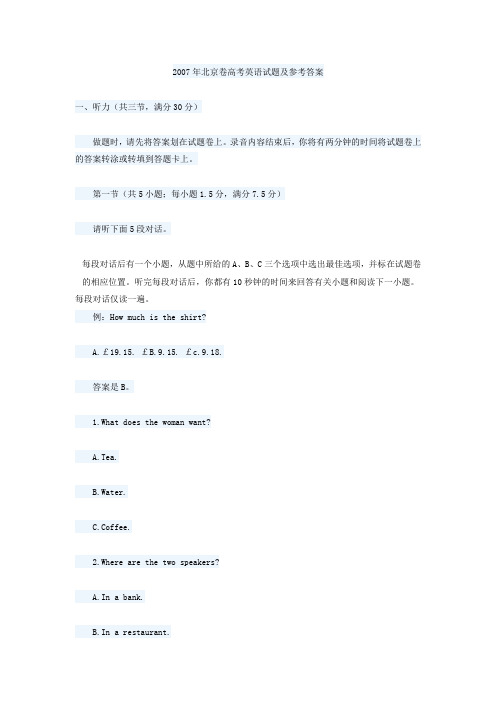
2007年北京卷高考英语试题及参考答案一、听力(共三节,满分30分)做题时,请先将答案划在试题卷上。
录音内容结束后,你将有两分钟的时间将试题卷上的答案转涂或转填到答题卡上。
第一节(共5小题;每小题1.5分,满分7.5分)请听下面5段对话。
每段对话后有一个小题,从题中所给的A、B、C三个选项中选出最佳选项,并标在试题卷的相应位置。
听完每段对话后,你都有10秒钟的时间来回答有关小题和阅读下一小题。
每段对话仅读一遍。
例:How much is the shirt?A.£19.15. £B.9.15. £c.9.18.答案是B。
1.What does the woman want?A.Tea.B.Water.C.Coffee.2.Where are the two speakers?A.In a bank.B.In a restaurant.c.In a post office.3.Which book has the woman bought?A.The math book.B.The history book.C.The English book.4.What will the woman do this evening?A.Meet her manager.B.Have a meeting.C.Go to the party.5.What does the woman mean?A.She hasnt met the new director yet.B.The new director went to London.C.She doesnt like the new director.第二节(共12小题;每小题1.5分,满分18分)请听下面4段对话或独白。
每段对话或独白后有几个小题,从题中所给的A、B、C三个选项中选出最佳选项,并标在试题卷的相应位置。
听每段对话或独白前,你将有时间阅读各小题,每小题5秒钟;听完后,各小题将给出5秒钟的作答时间。
07年6月北京统考听力和翻译部分及答案
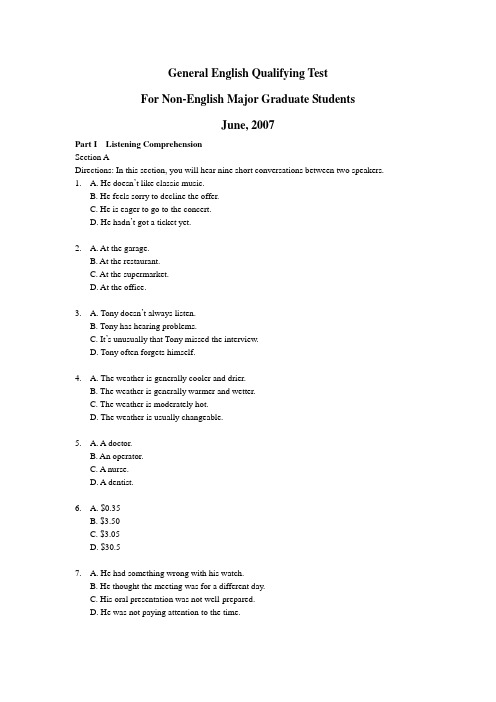
General English Qualifying TestFor Non-English Major Graduate StudentsJune, 2007Part I Listening ComprehensionSection ADirections: In this section, you will hear nine short conversations between two speakers.1. A. He doesn’t like classic music.B. He feels sorry to decline the offer.C. He is eager to go to the concert.D. He hadn’t got a ticket yet.2. A. At the garage.B. At the restaurant.C. At the supermarket.D. At the office.3. A. Tony doesn’t always listen.B. Tony has hearing problems.C. It’s unusually that Tony missed the interview.D. Tony often forgets himself.4. A. The weather is generally cooler and drier.B. The weather is generally warmer and wetter.C. The weather is moderately hot.D. The weather is usually changeable.5. A. A doctor.B. An operator.C. A nurse.D. A dentist.6. A. $0.35B. $3.50C. $3.05D. $30.57. A. He had something wrong with his watch.B. He thought the meeting was for a different day.C. His oral presentation was not well-prepared.D. He was not paying attention to the time.8. A. He didn’t attend Professor Smith’s class last time.B. He thinks the class will meet as scheduled.C. The woman should pose a more serious question.D. Professor Smith often cancels classes for the long weekend.9. A. The woman does not drink beer.B. It was not the woman’s coat.C. The woman just had her coat cleaned.D. The woman is not angry with the man.Section BDirections: In this section you will hear two mini-talks. Both the talks and the questions will be read to you only once.Mini-talk one10.A. 850,000 children, around two percent, are currently learning at home.B. School system provides teachers for homeschooling.C. All the states in the U.S. permit homeschooling.D. Homeschooled children are never expected to go to college.11.A. Because their children do not like attending schools.B. Because they love their children too much to send them away from home.C. Because homeschooling provides more time for the family to be together.D. Because they are able to help their kids to learn more social skills.12.A. A variety of honeybee.B. A geographic magazine.C. A National Home School Honor Society.D. A national top competition.Mini-talk two13.A. Importance of biodiversity.B. Protection of wild species.C. Farm pollution.D. Agricultural methods.14. A. Rice, maize, potato and wheat.B. Corn, bean, rice and wheat.C. Potato, maize, bean and rice.D. Rice, corn, wheat and sweat potato.15.A. They can harm wetlands, rivers and other environments needed to support life.B. They can destroy crops, native species and property.C. They spread in areas they are not native to with natural controls.D. They hardly survive different conditions.Section CDirections: In this section you will hear a short lecture. You will hear the recording twice. You now have 25 seconds to read the notes below.Lecture topic: Getting a good night’s sleep16.There are several ____________________ drugs available to help people sleep.If you don’t want to use drugs, there are some things you can do on your own to help get a good night’s sleep:17.1: ________________________________________________________________.18.2: ________________________________________________________________.19.3: ________________________________________________________________.20.4: ________________________________________________________________.Part V Translation (30 minutes, 20 points)Section AIn this book, we offer advice that we hope will seem reasonable and worth serious consideration. But as any experienced writer knows, there are occasions when even the best advice may not apply. The demands of writing for different audiences, with different purposes, on different subjects, at different levels of formality are so varied that they cannot begin to be anticipated in a book like this, and we recognize that what is appropriate for one piece of writing may not be appropriate for another. In most cases, you will have to avoid ambiguity at all costs so as not to leave your words open to misinterpretation.Section B中国可持续发展依赖的有限自然资源正在锐减。
2007专本真题听力文本
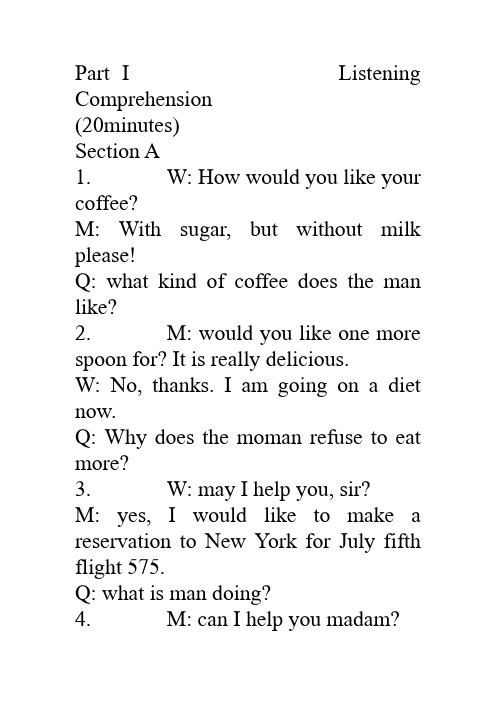
Part I Listening Comprehension(20minutes)Section A1. W: How would you like your coffee?M: With sugar, but without milk please!Q: what kind of coffee does the man like?2. M: would you like one more spoon for? It is really delicious.W: No, thanks. I am going on a diet now.Q: Why does the moman refuse to eat more?3. W: may I help you, sir?M: yes, I would like to make a reservation to New York for July fifth flight 575.Q: what is man doing?4. M: can I help you madam?W: well, I’d like to buy some note books.Q: where does the conversation most probably take place?5. W: what can I do for you sir? M: well, I need some socks and T-shirts.Q: where does the conversation most probably take place?6. W: where did you get the information about this job in our company?M: I read the advertisement in the newspaper last week.Q: where did the man get the information?7. M: I think I need to talk to the manager about it?W: you don’t have to, sir! I can exchange that coat for you.Q: What will the woman do?8. M: Mary, would you pleasephone Mr. Robinson? And ask him if I can cancel the appointment?W: certainly, I will try to explain what the problem is.Q: what does the man want Mary to do?9. W: Mr. White, I have to drawn up the schedule for tomorrow. M: but, I have to visit the factory first. Q: What is the man going to do first tomorrow?10. W:I got a few book for Magie, dear.M: A few? It seems you have bought up the whole bookstroe.Q: what does the man mean? Senction BPassage oneEveryday is different. I mean some days I spend hours on meeting with mycustomers, trying to find out exactly what they want. A lot of time, well , yes, a lot of time is spent on research. You see we ask people questions. We have to find out what a group of people think. Of cource, it is not just what they think, I mean people can say “ yes, that is great”. But what can’t see is “ does it sell the goods?” now, if we don’t show a rising sales, then we lose the customer. It is simple as that. Ideas, you know, they come to you everywhere at most unexpected times. In fact, the best idea came to me when I was in bath. Of course, the best ideas are the result of team work.. I mean we depend on everybody being active. That is what makes a good company. A team of people who can work both alone and together. Now the biggest weakness of the worl is that you are not allowed to make any expensive mistake.You always worry losing your job. 11. what does the speaker often do exactlly?12. what makes a good company?13. what does the speaker worry about?Passage twoGood morning, it is my pleasure to introduce to you, Mr. Athor. Johnson. he is the president and CEO of the Organization called First Sight. First Sight is special organization we have ever known. It selects and trains dogs to assist the blind people. Mr. Johnson himeself has a blind son. Years ago, he wanted to help this only son to lead a normal life. So he trained an intellegent dog to guide and help his son. Through his continual efforts, he became a expert in dog training. And the idea of starting an organization specially for helping blind people came into hismind. This is how First Sight has become a reality. Today, Mr. Johnson has helped thousands of blind people through out the country. Ladies and gentlemen, now lets welcome our honorable speaker, Mr. Athor Johnson.14. what does Mr. Johnson do ?15. what does he do to help the blind people?16. why does he think of helping the blind people?Passage threeI had a wonderful time in London last october. The weather was pleasant. I stayed in a small hotel for two nights not far from the city center. On the first day, I took a boat trip and enjoy the lovely sights along the river of Thames. The next day early in the morning, I went to Buckingham Palace to see the changing of the guards. That was reallyexciting. Later that afternoon, I went to Oxford Street, where there are a lot of famous shops. I bought some gifts for my friends and relatives at home. Two day’s was too short actually. I wish I could go to London again and spend more time there.17. how many days did the speaker spend in London?18. What did he do on the first day in London?19. why did he go to Oxford Street?20. how didi he feel about his visit to London?。
2007年高考英语试题及参考答案(北京卷)
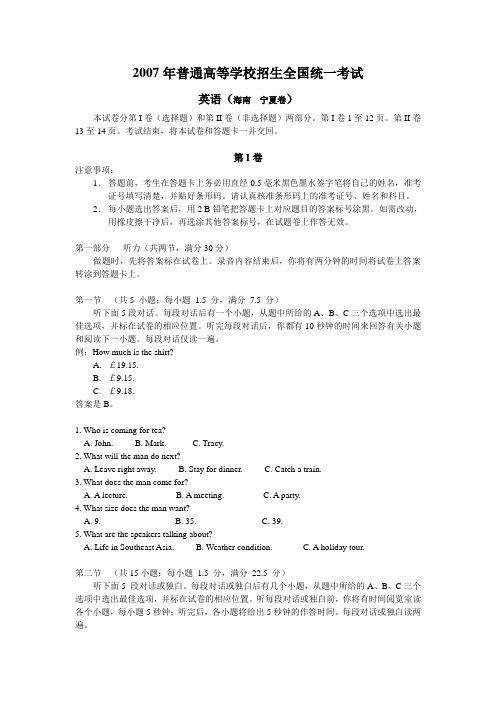
2007年普通高等学校招生全国统一考试英语(海南宁夏卷)本试卷分第I卷(选择题)和第II卷(非选择题)两部分。
第I卷1至12页。
第II卷13至14页。
考试结束,将本试卷和答题卡一并交回。
第I卷注意事项:1.答题前,考生在答题卡上务必用直经0.5毫米黑色墨水签字笔将自己的姓名,准考证号填写清楚,并贴好条形码。
请认真核准条形码上的准考证号、姓名和科目。
2.每小题选出答案后,用2 B铅笔把答题卡上对应题目的答案标号涂黑。
如需改动,用橡皮擦干净后,再选涂其他答案标号,在试题卷上作答无效。
第一部分听力(共两节,满分30分)做题时,先将答案标在试卷上。
录音内容结束后,你将有两分钟的时间将试卷上答案转涂到答题卡上。
第一节(共5 小题;每小题 1.5 分,满分7.5 分)听下面5段对话。
每段对话后有一个小题,从题中所给的A、B、C三个选项中选出最佳选项,并标在试卷的相应位置。
听完每段对话后,你都有10秒钟的时间来回答有关小题和阅读下一小题。
每段对话仅读一遍。
例:How much is the shirt?A.£19.15.B.£9.15.C.£9.18.答案是B。
1. Who is coming for tea?A. John.B. Mark.C. Tracy.2. What will the man do next?A. Leave right away.B. Stay for dinner.C. Catch a train.3. What does the man come for?A. A lecture.B. A meeting.C. A party.4. What size does the man want?A. 9.B. 35.C. 39.5. What are the speakers talking about?A. Life in Southeast Asia.B. Weather condition.C. A holiday tour.第二节(共15小题;每小题 1.5 分,满分22.5 分)听下面5 段对话或独白。
2007年北京高考英语听力题

2007年北京高考英语听力题2007年北京高考英语听力题第一部分:听力理解(共两节,30分)第一节(共5小题;每小题1.5分,共7.5分)听下面5段对话。
每段对话后有一道小题,从每题所给的A,B,C三个选项中选出最佳选项。
听完每段对话后,你将有10秒中的时间来回答有关小题和阅读下一小题,每段对话你将听一遍。
例:What is the man going to read?A. A newspaper.B. A magazine.C. A book.答案是A1. Where is the man from?A. Atlanta.B. New York.C. Washington,D. C.2. How much is the man’s telephone bill?A. $50.B. $24.C. $30.3. What does the woman want to watch?A. News.B. “Animal World”.C. Movie.4. Which apartment is the woman interested in?A. The one-bedroom apartment.B. The two-bedroom apartment.C. The three-bedroom apartment.5. What is the woman doing?A. Giving advice.B. Asking the way.C. Making a request.第二节(共15小题;每小题1.5分,共22.5分)听下面6段对话或独白,每段对话或独白后有几道小题,从每题所给的A. B. C.三个选项中选出最佳选项。
听每段对话或独白前,你将有5秒钟的时间阅读每小题。
听完后,每小题将给出5秒钟的作答时间。
每段对话或独白你将听两边。
听第6段材料,回答第7至7题。
6. Why is the woman late?A. She missed the bus.B. She couldn’t start her car.C. She couldn’t find the key.7. Where are the two speakers?A. At a garage.B. At a bus stop.C. At a restaurant.听第7段材料,回答第8至9题。
2007年全国听力原文
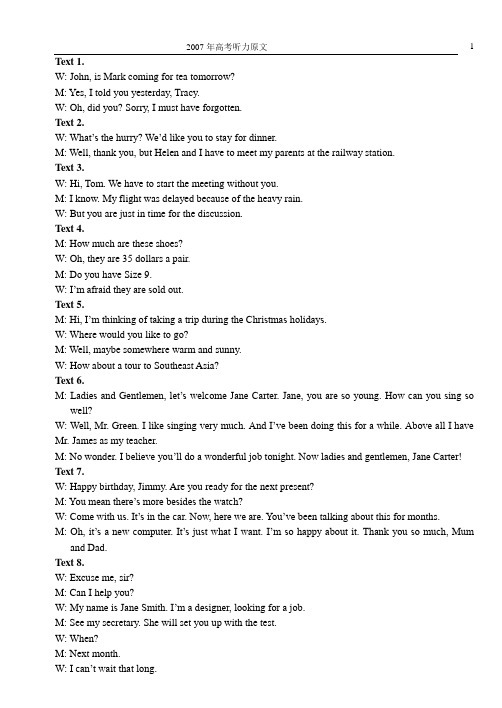
Text 1.W: John, is Mark coming for tea tomorrow?M: Yes, I told you yesterday, Tracy.W: Oh, did you? Sorry, I must have forgotten.Text 2.W: What’s the hurry? We’d like you to stay for dinner.M: Well, thank you, but Helen and I have to meet my parents at the railway station.Text 3.W: Hi, Tom. We have to start the meeting without you.M: I know. My flight was delayed because of the heavy rain.W: But you are just in time for the discussion.Text 4.M: How much are these shoes?W: Oh, they are 35 dollars a pair.M: Do you have Size 9.W: I’m afraid they are sold out.Text 5.M: Hi, I’m thinking of taking a trip during the Christmas holidays.W: Where would you like to go?M: Well, maybe somewhere warm and sunny.W: How about a tour to Southeast Asia?Text 6.M: Ladies and Gentlemen, let’s welcome Jane Carter. Jane, you are so young. How can you sing so well?W: Well, Mr. Green. I like singing very much. And I’ve been doing this for a while. Above all I have Mr. James as my teacher.M: No wonder. I b elieve you’ll do a wonderful job tonight. Now ladies and gentlemen, Jane Carter! Text 7.W: Happy birthday, Jimmy. Are you ready for the next present?M: You mean there’s more besides the watch?W: Come with us. It’s in the car. Now, here we are. You’ve b een talking about this for months.M: Oh, it’s a new computer. It’s just what I want. I’m so happy about it. Thank you so much, Mum and Dad.Text 8.W: Excuse me, sir?M: Can I help you?W: My name is Jane Smith. I’m a designer, looking for a job.M: See my secretary. She will set you up with the test.W: When?M: Next month.W: I can’t wait that long.M: Excuse me?W: I can’t wait a month. I need something sooner.M: I’m sorry.Text 9.M: Hi, Lily, how’s your new flat?W: It’s great. I really like it.M: How big is it?W: It’s one big room, but it has a bathroom and a small kitchen, too.M: How far is it from the office?W: It’s only about 10 minutes.M: 10 minutes by bus or by car?W: On foot. I walked to work this morning. I was 10 minutes early.M: You are lucky. I was 10 minutes late.W: What Happened?M: All the buses came late.W: What did Susan say?M: She was late too.W: What happened to her?M: She took the train, and it was late too.W: Well, then, you’re really lucky after all. But what are you going to do tomorrow.M: I’ll start out 15 minutes earlier.Text 10.M: Good afternoon, everybody and welcome to this class on English words. I hope that all of you can hear me. If not, please let me know. I am Pref. John Morris. I’ll be your teacher for the next 13 weeks. As you can probably tell, this is one of popular and crowded classes. Indeed, every time these courses are offered, this room is very full. Why is that? Well, in order to use the English language, it’s very important to have at least a basic understanding of how words are formed. Just to mention one figure, and there are many. There are about one million words in English. If you are an English learner, you might wonder how you can possibly remember all of these words. Well, for one thing you don’t have to. No native speaker exists who knows all of the words in the English language. Besides, there are shortcuts. Shortcuts? Yes, for example, if you know how words are formed by using parts of words from other languages, such Greek and French, you’ll understand a good number of English words when you first come across them. Let me put it this way. Knowing the rules will help you master a large number of words. This is probably the No. 1 reason why this class is so popular.。
2007年北京高级中等学校招生统一考试大纲卷

2007年北京市高级中等学校招生统一考试(大纲卷)英语试卷第I卷(机读卷共76分)第一部分听力(24分)一、听简短叙述,选择正确答案。
(简短叙述朗读两遍)(共4分,每小题1分)二、听对话和对话后的问题,选择正确的答案。
(对话和问题朗读两遍)(共6分,每小题1分)5.A.Jim Green. B.Mike Brown. C.Mike Green6.A.For three years. B.For five years. C.For seven years. 7.A.Basketball. B.Football. C.Baseball. 8.A.To see a film. B.To go shopping. C.To have dinner. 9.A.The girl’s mother. B.The girl’s father. C.The girl’s brother. 10.A.Black tea. B.White coffee. C.Black coffee.三、听对话和短文,根据对话和短文的内容,选择正确答案。
(对话和短文朗读两遍)(共14分,每小题2分)现在请听一段对话,完成第11、12小题。
11.Where are the two speakers?A.In a shop. B.In a school. C.In a hospital. 12.What does the boy have to do in the afternoon?A.To stay in bed. B.To go to school. C.To do his homework.现在请听一段对话,完成第13、14小题。
13.What makes the boy tired?A.Final exams. B.Tennis matches. C.Computer games. 14.When are they going to play tennis?A.In the morning. B.In the afternoon. C.In the evening.现在请听一段短文,完成第15、16、17小题。
- 1、下载文档前请自行甄别文档内容的完整性,平台不提供额外的编辑、内容补充、找答案等附加服务。
- 2、"仅部分预览"的文档,不可在线预览部分如存在完整性等问题,可反馈申请退款(可完整预览的文档不适用该条件!)。
- 3、如文档侵犯您的权益,请联系客服反馈,我们会尽快为您处理(人工客服工作时间:9:00-18:30)。
原文:第一节Text 1W: Where are you from?M: I’m from Atlanta, but I live in New York now.W: I live in Washington D.C.Text 2W: OK, John. How much do you pay for electricity and telephone services? M: My electricity bill is about 50 dollars a month, and my telephone bill is usu ally 24 dollars amonth.W: How much do you pay for transportation?M: 30 dollars a month.Text 3W: Do you happen to know what’s on after the news?M: I think it’s the Animal World. Do you mind if we watch it?W: Mm… can we watch the movie on Channel 6 instead?Text 4M: Hello.W: Hello. I’m calling about the apartment you advertised in the newspaper. M: Two-bedroom or three-bedroom?W: No, the advertisement says one-bedroom, one bath.M: Oh, sorry. That’s not available now.Text 5W: Excuse me.M: Yes?W: I need something for drawing a straight line.M: Oh, you want a ruler. There’s one on my desk. I’ll get it for you.第二节Text 6M: Mary, I am here!W: Oh, hi! I’m sorry I’m so late. The car wouldn’t start, so I had to come by b us.M: Oh, no. What do you think is the matter with your car?W: Well, it wouldn’t start at all. I mean, I turned the key and nothing happen ed. So I guess it’ssomething to do with the electrical system.M: Well, let’s forget about that now, and order our food. What would you like? The fish is good.Text 7M: Right, where shall we go now? We’ve seen the church and the modern art exhibition. Idon’t know what else there is here.W: How about some shops? I could buy something to take back for the kids. M: Mm… yes. OK. Let’s go down here and we’ll go into the main street.W: You know, it’s really good of you to spend so much time showing me arou nd.M: Oh, that’s all right. I’m enjoying it, actually. You know how it is. When you live in a town, younever really look at it yourself. Come on, let’s go down her e.Text 8W: Do you have a moment, Mark?M: Yeah, sure, Susan.W: I know this is short notice, but I wonder if you’d be able to fly out and giv e a speech aboutour project this weekend.M: But I thought you were going to do that.W: Well, yes. I was. But I’m terribly busy at the moment.M: This weekend? Couldn’t John go? He knows all about the project.W: Yeah, but he doesn’t know the people, and he doesn’t know the city. Mark , I think you’rethe right person for the job.M: I get the message.W: Thanks, Mark.M: Yeah.Text 9W: Hi, Tony!M: Hello, Kate! How are you?W: Oh, fine, thanks. And you and Jane?M: Oh, we’re fine. How long are you staying?W: Just a couple of days. And then I’ll be back to work in Tokyo.M: What a pity you are not staying in London for a bit longer. Anyway, how a bout dinnertonight?W: I’d love to, but I’m seeing some customers from Oxford this evening. Wha t abouttomorrow?M: That’d be lovely. Jane will be pleased.W: What time shall I come?M: How about eight?W: Great. I’ll see you tomorrow then.Text 10W: Oh, Frank’s in your class? He was in my class last term. I didn’t like him a t all.M: What? You didn’t like Frank? He’s one of my best students.W: Oh, no. Not Frank! He was always asking questions. Frank always interru pted me and theother students. He was never quiet.M: Yes, that’s Frank. That’s why he is such a good student. He is always think ing and trying touse English. He laughs a lot. Frank doesn’t worry about maki ng mistakes. I enjoy having him inclass.W: Not me. I love students like David. Do you have him in your conversatio n class this term?M: Yes, but to be honest, David is too quiet for me. I can’t tell if he’s learning. David is sosilent. He doesn’t say anything.W: Yes, that’s David. That’s how good students should be. They have to listen to theirteachers.Text 11M: When I tell people that I paint the Golden Gate Bridge, they think I start a t one end, paint tothe other end, and then start again. But that’s not true. We are always painting the bridge. Butwe have to go where paint is in bad condit ion. It’s a dangerous job. You have to be careful allthe time. You can’t work o r appear without safety equipment. And the weather, it gets colderup here. S ometimes it’s so cold there’s ice on the bridge. You have to wear warm clothe s.Sometimes it’s windy and foggy. On foggy days, you can’t see anything. Ot her times, you areboth the fog. The view from the top is the thing that I love about the job. On a sunny day liketoday, you can see from the ocean to the p ort and all the way to the mountains.。
